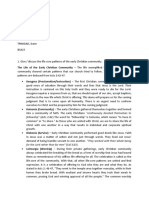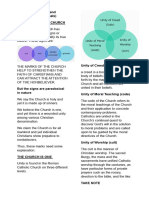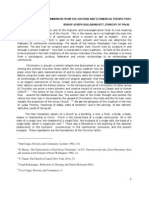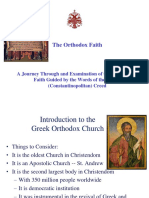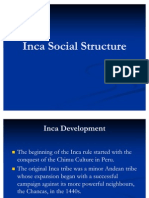0 ratings0% found this document useful (0 votes)
38 viewsTalking Points General
Talking Points General
Uploaded by
Gerrive OliverosA life consecrated to God is characterized by professing the evangelical counsels of poverty, chastity, and obedience within a permanent state of life recognized by the Church. There are several forms of consecrated life including eremetic life, consecrated virgins and widows, religious life lived within canonically erected institutes, secular institutes whose members commit to evangelization in the world, and societies of apostolic life whose members pursue particular apostolic purposes without vows. The evangelical counsels aim to live in intimacy with God through trusting dependence and willing surrender to God's will.
Copyright:
© All Rights Reserved
Available Formats
Download as PDF, TXT or read online from Scribd
Talking Points General
Talking Points General
Uploaded by
Gerrive Oliveros0 ratings0% found this document useful (0 votes)
38 views4 pagesA life consecrated to God is characterized by professing the evangelical counsels of poverty, chastity, and obedience within a permanent state of life recognized by the Church. There are several forms of consecrated life including eremetic life, consecrated virgins and widows, religious life lived within canonically erected institutes, secular institutes whose members commit to evangelization in the world, and societies of apostolic life whose members pursue particular apostolic purposes without vows. The evangelical counsels aim to live in intimacy with God through trusting dependence and willing surrender to God's will.
Original Description:
General
Copyright
© © All Rights Reserved
Available Formats
PDF, TXT or read online from Scribd
Share this document
Did you find this document useful?
Is this content inappropriate?
A life consecrated to God is characterized by professing the evangelical counsels of poverty, chastity, and obedience within a permanent state of life recognized by the Church. There are several forms of consecrated life including eremetic life, consecrated virgins and widows, religious life lived within canonically erected institutes, secular institutes whose members commit to evangelization in the world, and societies of apostolic life whose members pursue particular apostolic purposes without vows. The evangelical counsels aim to live in intimacy with God through trusting dependence and willing surrender to God's will.
Copyright:
© All Rights Reserved
Available Formats
Download as PDF, TXT or read online from Scribd
Download as pdf or txt
0 ratings0% found this document useful (0 votes)
38 views4 pagesTalking Points General
Talking Points General
Uploaded by
Gerrive OliverosA life consecrated to God is characterized by professing the evangelical counsels of poverty, chastity, and obedience within a permanent state of life recognized by the Church. There are several forms of consecrated life including eremetic life, consecrated virgins and widows, religious life lived within canonically erected institutes, secular institutes whose members commit to evangelization in the world, and societies of apostolic life whose members pursue particular apostolic purposes without vows. The evangelical counsels aim to live in intimacy with God through trusting dependence and willing surrender to God's will.
Copyright:
© All Rights Reserved
Available Formats
Download as PDF, TXT or read online from Scribd
Download as pdf or txt
You are on page 1of 4
Consecrated What is Consecrated Life:
Life A life consecrated to God is characterized as one in
which the individual professes the evangelical counsels
(poverty, chastity, and obedience) within a permanent
state of life recognized by the Church.
“The state of consecrated life is thus one way of
experiencing a “more intimate” consecration, rooted
in Baptism and dedicated totally to God. In the
consecrated life, Christ’s faithful, moved by the Holy
Spirit, propose to follow Christ more nearly, to give
themselves to God who is loved above all and, pursuing
the perfection of charity in the service of the Kingdom,
to signify and proclaim in the Church the glory of the
world to come.” (CCC 916)
Forms of Consecrated Life:
Eremetic Life
Without always professing the three evangelical
counsels publicly, hermits “devote their life to the
praise of God and salvation of the world through
a stricter separation from the world, the silence
of solitude and assiduous prayer and penance.”
(Catechism ¶920)
Consecrated Virgins and Widows
From apostolic times Christian virgins and widows,
called by the Lord to cling only to him with greater
freedom of heart, body, and spirit, have decided with
the Church’s approval to live in the respective states
of virginity or perpetual chastity “for the sake of the
Kingdom of heaven.” (Catechism ¶922)
Consecrated Religious
Religious life was born in the East during the first
centuries of Christianity. Lived within institutes
canonically erected by the Church, it is distinguished
Consecrated from other forms of consecrated life by its liturgical
character, public profession of the evangelical
Life counsels, fraternal life led in common, and witness
given to the union of Christ with the Church.
(Catechism ¶925)
Secular Institutes
By a “life perfectly and entirely consecrated to [such]
sanctification,” the members of these institutes share
in the Church’s task of evangelization, “in the world
and from within the world,” where their presence
acts as “leaven in the world.” “Their witness of
a Christian life” aims “to order temporal things
according to God and inform the world with the
power of the gospel.” They commit themselves to
the evangelical counsels by sacred bonds and observe
among themselves the communion and fellowship
appropriate to their “particular secular way of life.”
(Catechism ¶929) (ref. www.secularinstitutes.org)
Societies of Apostolic Life
Alongside the different forms of consecrated life are
“societies of apostolic life whose members without
religious vows pursue the particular apostolic purpose
of their society, and lead a life as brothers or sisters
in common according to a particular manner of
life, strive for the perfection of charity through the
observance of the constitutions. Among these there
are societies in which the members embrace the
evangelical counsels” according to their constitutions.
(Catechism ¶930)
Consecrated The Evangelical Counsels
Life through the lens of the Constitutions of the
Congregation of Holy Cross:
Poverty
“In consecrated poverty we seek to share the lot of the
poor and to unite in their cause, trusting in the Lord as
provider.” (¶ 44)
Chastity:
“In consecrated celibacy we wish to love with the free-
dom, openness and availability that can be recognized
as a sign of the kingdom.” (¶ 44)
Obedience:
“In consecrated obedience we join with our brothers in
community and with the whole church in the search for
God’s will.” (¶ 44)
In General:
“Great is the mystery and meaning within these vows.
And yet their point is simple. They are an act of love for
the God who first loved us. By our vows we are com-
mitted to single-hearted intimacy with God, to trusting
dependence upon God and to willing surrender to God.
We wish thus to live in the image of Jesus, who was sent
in love to announce God’s rule and who beckons to us
to follow him.”(¶ 43)
Consecrated Dates of Note
Life for Holy Cross Religious:
• Our Lady of Sorrows (Sept 15th)
• St. Joseph (March 19th)
• Sacred Heart (June 12th, 2015)
• Fr. Moreau (January 20th)
• St. Andre (January 7th)
• Fundamental Pact (March 1st, 1837)
• Fr. Moreau’s Perpetual Vows (August 15th, 1840)
Resources
from the Office of Vocations:
The following items can be downloaded free on our
website. Visit: holycrossvocations.org
• Suggestions for books or movies on the topic of
Consecrated Life
You might also like
- Curriculum VitaeDocument5 pagesCurriculum Vitaesportanica100% (2)
- The Life of The FIrst Christians in Jerusalem: A Model CommunityDocument25 pagesThe Life of The FIrst Christians in Jerusalem: A Model Communityjosephrandalldeiparine100% (1)
- Rel 103 - Midterm ModuleDocument8 pagesRel 103 - Midterm Moduleclip claps1No ratings yet
- Phoebe & Laurence Bendit - Intro To Analytical PsychologyDocument11 pagesPhoebe & Laurence Bendit - Intro To Analytical PsychologyTom RueNo ratings yet
- E. CommunionDocument5 pagesE. CommuniondbyouthcentrepuneNo ratings yet
- Mystical Body of ChristDocument20 pagesMystical Body of Christcpg080910No ratings yet
- The Church As A Communion of Saints: Charity Is The Voluntary Giving of Help To Those in NeedDocument15 pagesThe Church As A Communion of Saints: Charity Is The Voluntary Giving of Help To Those in NeedSara Jean B. MangmangNo ratings yet
- TH 094528Document15 pagesTH 094528Edward TangonanNo ratings yet
- Chapter One The Call To Holiness Solemnity of Christ TheDocument20 pagesChapter One The Call To Holiness Solemnity of Christ Theoldaltarboy7137No ratings yet
- RE 3 - Module 1 - Church and Structure of Christ Faithful - STUDENTDocument5 pagesRE 3 - Module 1 - Church and Structure of Christ Faithful - STUDENTJunel SildoNo ratings yet
- Grade 9 Lesson 15Document7 pagesGrade 9 Lesson 15JennieNo ratings yet
- MJS REV PowerPoint Chapter1Document18 pagesMJS REV PowerPoint Chapter1collinmanderson100% (1)
- Eclesiologia PPT English n.2Document14 pagesEclesiologia PPT English n.2Mariano AmoresNo ratings yet
- Consecrated LifeDocument15 pagesConsecrated LifeAkila Janith100% (1)
- Consecrated LifeDocument3 pagesConsecrated LifeHerman Joseph KalungiNo ratings yet
- What Is Confirmation HandoutsDocument5 pagesWhat Is Confirmation HandoutsSally ChambersNo ratings yet
- 10.3b.1 The Characteristics of The ChurchDocument10 pages10.3b.1 The Characteristics of The Churchsherylmatchado07No ratings yet
- LESSON - RELIGION 10 - First CHRISTIAN CommunityDocument3 pagesLESSON - RELIGION 10 - First CHRISTIAN CommunityCarlota RamirezNo ratings yet
- Elements of LiturgicalDocument25 pagesElements of LiturgicalJohn Carl AparicioNo ratings yet
- Sacraments of InitiationDocument4 pagesSacraments of Initiationdayannaaa0304No ratings yet
- Unit One: What Is Church?Document46 pagesUnit One: What Is Church?louanlimNo ratings yet
- Communion of The SaintsDocument7 pagesCommunion of The SaintsKirsty Jane DilleraNo ratings yet
- 01 Calling in LifeDocument41 pages01 Calling in LifePaolo C. RasalanNo ratings yet
- Lesson 10Document5 pagesLesson 10France Loise CoronadoNo ratings yet
- Lesson 4 The Church in The Light of Vatican IIDocument12 pagesLesson 4 The Church in The Light of Vatican IIMiles DivinagraciaNo ratings yet
- THY4 - U2 - LESSON 2 - Final PDFDocument22 pagesTHY4 - U2 - LESSON 2 - Final PDFxxpinkywitchxxNo ratings yet
- Rel Midterm ReviewerDocument7 pagesRel Midterm Reviewerhazel monteroNo ratings yet
- Ing Circular - November 2024Document14 pagesIng Circular - November 2024hanleygomes2203No ratings yet
- The ChurchDocument18 pagesThe ChurchAbegail DagcutaNo ratings yet
- Assignment by Group - REDDocument3 pagesAssignment by Group - REDFerl Diane SiñoNo ratings yet
- EcumenismDocument55 pagesEcumenismJessie OcampoNo ratings yet
- Eremitical LifeDocument4 pagesEremitical LifeMar P100% (3)
- RS Group 5 - Consecrated Life FinalDocument38 pagesRS Group 5 - Consecrated Life FinalFordy CariñoNo ratings yet
- THEOLOGY 3 NOTES & REVIEWER (Finals 1st Sem)Document18 pagesTHEOLOGY 3 NOTES & REVIEWER (Finals 1st Sem)Princess Delos SantosNo ratings yet
- THEOLOGY 3 NOTES & REVIEWER (Finals 1st Sem)Document6 pagesTHEOLOGY 3 NOTES & REVIEWER (Finals 1st Sem)Princess Delos SantosNo ratings yet
- CDC #13 - Communion of Saints & Forgiveness of SinsDocument15 pagesCDC #13 - Communion of Saints & Forgiveness of SinsBhagoo HatheyNo ratings yet
- Notes - The Church - Vocations To Holiness Sections 44 To 48 Answers To Questions On Page 185Document4 pagesNotes - The Church - Vocations To Holiness Sections 44 To 48 Answers To Questions On Page 185Emmanuel maria masereka OFM capNo ratings yet
- Saints of The Catholic Church: Doctrinal Catechesis SessionDocument18 pagesSaints of The Catholic Church: Doctrinal Catechesis SessionFoxcostaNo ratings yet
- The Church: A Mystery and A Sacrament: God'S MessageDocument3 pagesThe Church: A Mystery and A Sacrament: God'S MessageMylene HeragaNo ratings yet
- Nicodemus, Ryan G - Ecclesiology - Written ReportDocument7 pagesNicodemus, Ryan G - Ecclesiology - Written ReportCary TolenadaNo ratings yet
- Lumen Gentium EtcDocument84 pagesLumen Gentium EtcArden AnagapNo ratings yet
- Baptism NotesDocument45 pagesBaptism NotesLeon GuintoNo ratings yet
- Religious LifeDocument28 pagesReligious Life3amabelle arevaloNo ratings yet
- Seminar PresentationsDocument26 pagesSeminar PresentationsmarthomayogamNo ratings yet
- The 7 SacramentsDocument60 pagesThe 7 SacramentsMackenzie LaurenNo ratings yet
- Church As Sacrament Ecol ShennaDocument6 pagesChurch As Sacrament Ecol ShennaJoenetha Ann ApariciNo ratings yet
- Participant Guide Session 2Document11 pagesParticipant Guide Session 2covchurchNo ratings yet
- Antiochian Orthodox Information Printable Brochure Trifold The Orthodox Church SecDocument2 pagesAntiochian Orthodox Information Printable Brochure Trifold The Orthodox Church Secsannicolas1952No ratings yet
- Chapter Three Consecrated Life - A Special CallDocument9 pagesChapter Three Consecrated Life - A Special CallVivin Rodrhics100% (1)
- 01 Calling in LifeDocument41 pages01 Calling in LifeLourizMavericS.SamonteNo ratings yet
- 1603-601-Intro To Orthodoxy Through The Creed March 2016Document134 pages1603-601-Intro To Orthodoxy Through The Creed March 2016Stefan SpinuNo ratings yet
- Witnessing Christian Mission: (Getting To Know The Church: A Mystery and A Sacrament Scriptural Images of The Church)Document19 pagesWitnessing Christian Mission: (Getting To Know The Church: A Mystery and A Sacrament Scriptural Images of The Church)Kenji Roxas LazagaNo ratings yet
- TheoDocument6 pagesTheoRichard AlfonsoNo ratings yet
- 7 Sacrament of ChurchDocument9 pages7 Sacrament of Churcharkitektura489No ratings yet
- Sacrament of Christian InitiationDocument7 pagesSacrament of Christian InitiationkanyoniNo ratings yet
- Death HomilyDocument3 pagesDeath HomilyTony KayalaNo ratings yet
- The Affirmation of St. LouisDocument11 pagesThe Affirmation of St. LouisMauricio LargaespadaNo ratings yet
- Ecclesial Dimension of The LiturgyDocument30 pagesEcclesial Dimension of The LiturgyJohn Carl Aparicio100% (1)
- To Persevere in Love: Meditations on the Ministerial Priesthood from an Anglican PerspectiveFrom EverandTo Persevere in Love: Meditations on the Ministerial Priesthood from an Anglican PerspectiveNo ratings yet
- Every Tribe: Stories of Diverse Saints Serving a Diverse WorldFrom EverandEvery Tribe: Stories of Diverse Saints Serving a Diverse WorldNo ratings yet
- The Water and the Blood: How the Sacraments Shape Christian IdentityFrom EverandThe Water and the Blood: How the Sacraments Shape Christian IdentityNo ratings yet
- Uau 6Document107 pagesUau 6Gerrive OliverosNo ratings yet
- Q&A Session 2 Vesc2gm: For The Second Time, Are You Guys Ready?Document22 pagesQ&A Session 2 Vesc2gm: For The Second Time, Are You Guys Ready?Gerrive OliverosNo ratings yet
- Q&A SessionDocument14 pagesQ&A SessionGerrive OliverosNo ratings yet
- STBBDocument195 pagesSTBBGerrive OliverosNo ratings yet
- Blind SpotDocument34 pagesBlind SpotGerrive OliverosNo ratings yet
- NiteDocument82 pagesNiteGerrive OliverosNo ratings yet
- Recognizing A Firm's Intellectual Assets: Moving Beyond A Firm's Tangible ResourcesDocument36 pagesRecognizing A Firm's Intellectual Assets: Moving Beyond A Firm's Tangible ResourcesGerrive OliverosNo ratings yet
- This Heart You Reside In: NotesDocument51 pagesThis Heart You Reside In: NotesGerrive OliverosNo ratings yet
- IT Auditing, Hall, 3eDocument33 pagesIT Auditing, Hall, 3eGerrive OliverosNo ratings yet
- Major Economic System and The Current Economic System of The PhilippinesDocument2 pagesMajor Economic System and The Current Economic System of The PhilippinesGerrive OliverosNo ratings yet
- Inca Social StructureDocument19 pagesInca Social StructureRebecca Hefter CarmonaNo ratings yet
- The Sociology of Anthony Giddens - (5 Time Space and Historical Sociology)Document22 pagesThe Sociology of Anthony Giddens - (5 Time Space and Historical Sociology)Andrew MkombaNo ratings yet
- Original Job ApplicationDocument3 pagesOriginal Job Applicationapi-438011805No ratings yet
- 2000 Word Essay PresentationDocument13 pages2000 Word Essay PresentationOdette BrownNo ratings yet
- Gramsci - Prison Notebooks Volume 3Document680 pagesGramsci - Prison Notebooks Volume 3Mark Malone100% (10)
- Binder 1Document87 pagesBinder 1Ahmad ThaherNo ratings yet
- Classical Liberalism, Neoliberalism and Ordoliberalism-Elzbieta MaczynskaDocument23 pagesClassical Liberalism, Neoliberalism and Ordoliberalism-Elzbieta MaczynskaSávio Coelho100% (1)
- List of Exchanges in KuwaitDocument6 pagesList of Exchanges in KuwaitenquiryNo ratings yet
- Daftar PustakaDocument10 pagesDaftar PustakaNad CloNo ratings yet
- My Coombs Family 000-010-ADocument269 pagesMy Coombs Family 000-010-AJoni Coombs-Haynes100% (1)
- Approaches To The Study of GlobalizationDocument3 pagesApproaches To The Study of GlobalizationStephen Patingo Madero100% (1)
- Relocated Buildings, Etc., in PhiladelphiaDocument13 pagesRelocated Buildings, Etc., in PhiladelphiaHarry KyriakodisNo ratings yet
- Reflection StsDocument2 pagesReflection StsirenemaebalasotoNo ratings yet
- ShipDocument101 pagesShipfzierNo ratings yet
- GSP-Registration-Form G1&G2Document2 pagesGSP-Registration-Form G1&G2Teacher BhingNo ratings yet
- Guidance FOR National Representatives of The European Radiology Trainees ForumDocument5 pagesGuidance FOR National Representatives of The European Radiology Trainees ForumMaria João GonçalvesNo ratings yet
- Rhetorical Analysis EssayDocument6 pagesRhetorical Analysis EssayTori ThomasNo ratings yet
- Zirlai 20Document2 pagesZirlai 20Pascal ChhakchhuakNo ratings yet
- Gregory T. Armstrong, Constantine's Churches-Symbol and Structure, JSAH 33 (1974) 5-16 PDFDocument13 pagesGregory T. Armstrong, Constantine's Churches-Symbol and Structure, JSAH 33 (1974) 5-16 PDFMarko DabicNo ratings yet
- Siba Testing ServicesDocument92 pagesSiba Testing ServicesCricket Station 24No ratings yet
- Chapter - 6 Work and Economic Life PDFDocument9 pagesChapter - 6 Work and Economic Life PDFshalu vermaNo ratings yet
- Koha Digest 40 (1995)Document17 pagesKoha Digest 40 (1995)palacios_jmNo ratings yet
- 2nd Quarter Handout IntroDocument10 pages2nd Quarter Handout IntroXianPaulette Mingi ManalaysayNo ratings yet
- Soros - Open SocietyDocument222 pagesSoros - Open SocietyZerohedge100% (3)
- THE BIHAR 1st EditionDocument44 pagesTHE BIHAR 1st EditionRajeev KumarNo ratings yet
- Duct Systems DesignDocument4 pagesDuct Systems DesignFsNo ratings yet
- Tanzania Directory of Civil Society Organizations 2017 2018Document256 pagesTanzania Directory of Civil Society Organizations 2017 2018Fred Raphael Ilomo0% (1)
- Auto Recovery Save of Kush Caliphate of North AmexemDocument27 pagesAuto Recovery Save of Kush Caliphate of North AmexempaxateicNo ratings yet





























